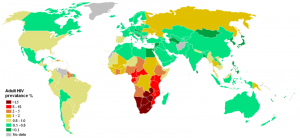Although we sometimes think of HIV/AIDS as a global problem, it's important to shine a light back on how it affects us at home. The
New England Journal of Medicine recently revealed that 1 in 30 adults in Washington, D.C. are infected with HIV - a greater prevalence than the rates in Ethiopia, Rwanda, or Nigeria.
[caption id="attachment_417" align="alignleft" width="300" caption="There are many countries with less serious HIV/AIDS problems than the US. According to the New England Journal of Medicine, Washington, D.C. would fall in the 2 to 5 percent range, the first shade of brown/red. Click to expand."]

[/caption]
What is the solution to this dilemma? According to Brad Ogilvie of the
Mosaic Initiative, the answer is to get tested.
In an
article by Jennifer Grant in the Chicago Tribune, Ogilvie describes the mission and strategy of his organization. Their goals are to ensure everyone knows their HIV status and to expand home testing from the FDA Approved blood tests (that we currently carry) to other types of test, including a saliva test. This would make the cost of getting an HIV self test only $8 instead of $50. The technology is available and put to use in clinics each day but such tests are just not available over the counter yet.
Why aren't these tests available over the counter? This question has caused some frustration among HIV/AIDS activists such as Ogilvie. The primary reasons seems to be concern that a person might self test incorrectly. Here is a list from
The Body of the conditions that are placed on the sale of rapid HIV tests:
"1. Sale is restricted to clinical laboratories that have
- an adequate quality assurance program, including planned systematic activities to provide adequate confidence that requirements for quality will be met, and
- where there is assurance that operators will receive and use the instructional materials."
2. The test is approved for use only by an agent of a clinical laboratory.
3. Test subjects must receive a "Subject Information" pamphlet and pre-test counseling prior to specimen collection and appropriate counseling when test results are provided.
4. The test is not approved for use to screen blood, cell, plasma, or tissue donors."
Do you think that sales should continue to be restricted? Or should such tests be available in the home market? Let us know what you think and remember that you can still obtain
anonymous HIV testing with a home HIV test today.